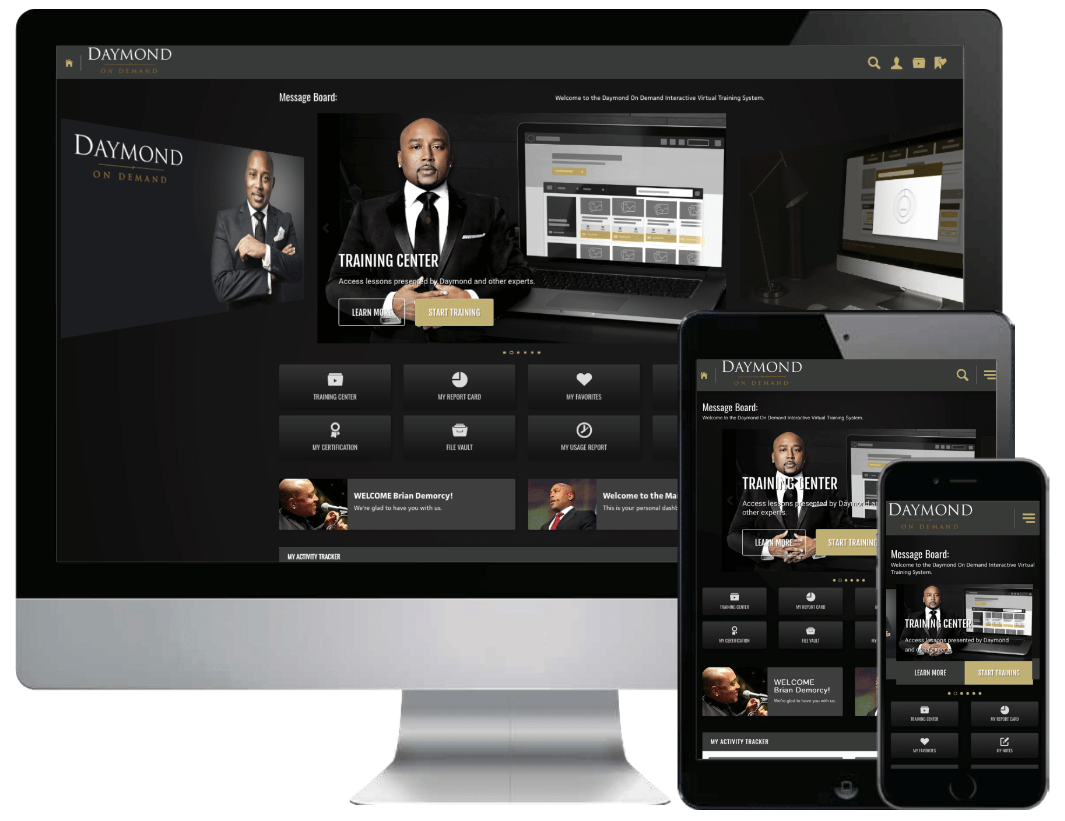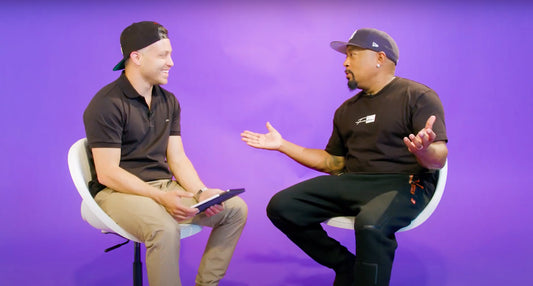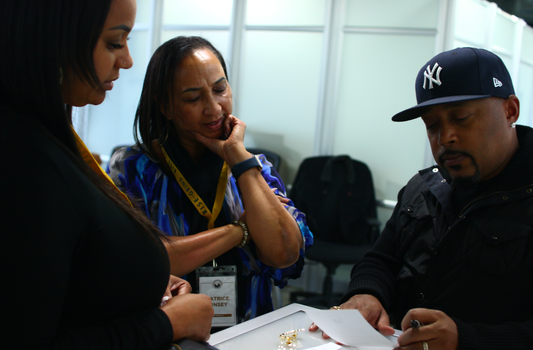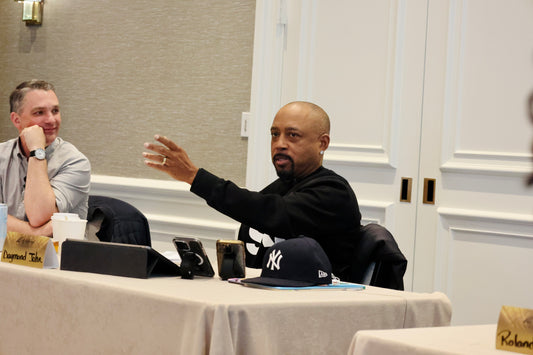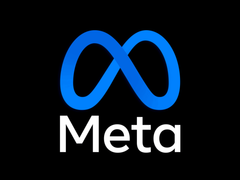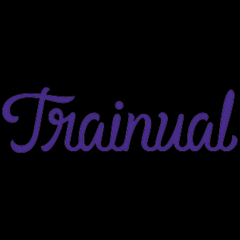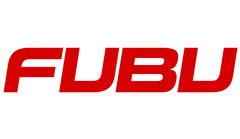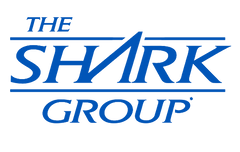This is Part Two of a three part series where I spoke with the co-founders of Bombas. If you haven't read the Part One, I suggest you go back and read that first! These guys have a great story to share and I want to make sure you guys are able to learn from them! I hope you enjoy, let me know what you think about this section in the comments!
Their “Power of Broke”
Daymond: The “power of broke” doesn't mean that you have to be broke to practice it. I use it on a daily basis. First of all, are there any “power of broke” stories where, as you were growing the brand, didn't know how you were going to get from A to B, and forced you to think creatively? Any “power of broke” stories that you can talk about that just made you kind of think outside the box and work in other ways that, if you had had the money, you would have done differently?
David: I think the first, and kind of most obvious one for us, is Randy and I had both quit our jobs about a year before we actually launched the business, not really understanding with a clear sight in line of when or how the business would launch. The conversations that we constantly had were that at some point we need to order forty-thousand-dollars’ worth of inventory as our first production run. Neither of us had the capability of putting that up; we didn't really feel comfortable taking money from family and friends without knowing that there was something really here that resonated with the consumer.
We were like, how are we going to get the word out there, and how can we do it without really spending anything? That's ultimately what led us to deciding to launch the company on IndieGoGo, the crowd funding platform. We saw it as an opportunity, as a great proof of concept where if it didn't work, we would have a clear indication as to why people don't resonate with the design, or the brand, or the mission. If it did work, we, basically on pre-sales alone, we could help fund the initial order. Kind of get the initial capital that we needed to get the business going.We launched the campaign the beginning of August of 2013 and we were really blown away by the initial response. We set a goal of $15,000, and ended up beating that goal within the first twenty-four hours. We ended up doing just over $20,000 within the first day, and went on to raise just under a $150,000 within our thirty-day campaign.
Daymond: Do you attribute any creative, like IndieGoGo, and KickStarter, are big platforms, a lot of people get lost in the shuffle. Do you attribute it at anything specific, maybe the way in which you laid out the IndieGoGo campaign? The video, or anything you could attribute to the success of the IndieGoGo campaign?
Randy: I'm not going to lie, there's a built-in audience there. To get our momentum going behind the campaign, that was a big part of the success. I think a lot of it was that, and another part of it was the video that we did. It took us three months to write the script for that video. Now it seems very clear what it is and what it stands for, but at the time, that was sort of the process of really making what Bombas is apparent, what we knew it could be. Really getting the voice down and really making sure that we were representing the company right and telling the story right. It was a little bit of powerful storytelling. Dave and I sitting down, cranking through that and making sure that we got it right. Maybe over-analyzing it in a good way. Then the other part was elbow grease.
David: One of the other key success factors for us in this as well, and this is something that I tell a lot of people whether they're looking to start on IndieGoGo, or just start a company in general is, we from day one and throughout the two-year developmental process of figuring out the product and what we were going to be and stand for, we weren't shy about telling other people. Telling our friends, our family, our co-workers, strangers that we met about what we were doing and thinking about. I think that had a huge impact on why we were able to gain twenty thousand dollars in the first twenty-four hours. Throughout those two years, we were building up a group of followers where we made them feel like they were as much of a part of this journey as we were. I'd have friends or people that I didn't talk to that often be like, "How's the sock thing coming along? You gave me a sample pair a month ago and they're my favorite pair of socks. I told everybody I know about them." So when we were ready to officially launch the business on IndieGoGo, we already had this mass of people behind us that were cheering for us, rooting for us. "I got an early pair, I remember that day that we sat in that coffee shop and you told me about this crazy idea for a sock company."They feel close to it in a way. When we made the official launch, we said, "We're live, we need your help in spreading the word. “They felt as proud of it as we did because again, we really welcomed everybody in being a part of this journey with us.
Daymond: That makes a lot of sense. You guys have that passion; it's not like you're just chasing the dollar. When you have a passion for what you're doing, nothing's going to stop you from achieving it so long as you make sure have all the things you talked about. obviously you have to have a business sense about what you're doing and make sure there's a need for what you're creating. It seems like you really got that community engaged around you.
David: Exactly.
Daymond: Let's say you're talking to an entrepreneur, a struggling, aspiring entrepreneur, and they say, "I'm broke, I don't have a penny to my name, and I have this idea, but I'm broke. I can't do anything." What would be your advice to those people out there that think of broke as a five-letter word? What advice could you give them?
David: I think the answer that I personally always give to people is that you got to focus on the things that you can control. You may not have control over being broke, but what you do have control over is your hustle. You have control over knocking on as many doors and talking to as many people as possible. Throughout that process, you're going to get a lot of no's. You're going to get discouraged, and have people tell you that your idea is dumb, or that it'll never work. It only takes that one person, whether it's a potential client, or a potential account or a potential investor, or a potential advisor to say, "I think there's something here. I like you. You've got this tenacity about you." It's getting up at bat a number of times. You can't get up at bat the first time and assume you're going to hit a home run. It takes a lot of work, and I think tenacity is the other one. As Randy kind of alluded to, the elbow grease. I talk to a lot of people who are launching these IndieGoGo campaigns and they're like, "We launched and there's no traffic. How do we get people to our campaign? How can we get somebody in the press to cover it?" You can't control the press covering your thing, but I'll tell you what you can control. You can control taking your entire email list and blasting out an email to every person that you've ever been in touch with, and communicating to them how important this is to you and how much it would mean to you if they would support your campaign in any type of capacity. The same way that people do when they're running races, trying to raise money for a specific cause that they're passionate about. You just kind of have to be ruthless to a certain degree and not really take no as an answer. Just continue to knock down doors. It takes a lot of no's, but you'll go through a lot of no's to get to that one yes. Once you have that one yes, it gives you a little bit of momentum that you need.
The “Power of Broke” to Activate Their First Email Chain
Daymond: You talk about an email list, which is so important. It's like your license to print money, right? Most people think that in order to scale and have any type of volume, you need to go on a B to B model, unless you have tons and tons of money to advertise, to rev up your B to C. Can you talk about how you were able to build up your list, your social media amplification, or just things that you did that kind of reflect this “power of broke” that can be a testimony that you can build a B to C model, without having to spend a ton of money? Some of the key elements?
David: I think most people are like, "Well, I don't have access to a big email list." Well, if you've been using email as a point of communication since it's been around, which most people have, I quickly discovered that Gmail or any of these other platforms, you can go into contacts. You have a list of people that you regularly contact, but then you can click all. All is literally a list of emails of anybody that's either emailed you, or you've emailed. Again, I don't really care who's on this. I downloaded that entire list. I think I had seven thousand people, ranging from people that I'd bought tickets to a concert off of Craigslist, to Airbnb, to former camp counselors, to whatever. I just shamelessly blasted out to that list when we first launched. I was like, "Hey, you may not remember me, we're launching something exciting that's meaningful," and that's where we got our list. Most people are on Facebook and have social media channels. Those are lists, right? It's finding the things that are already at your disposal that you may not recognize are kind of the starting point of how you can communicate this out to a group of people. Then you utilize the standard social media practices of, "Please click this link for other people, or forward this email on to at least five friends," whatever it is that helps take that seven-thousand-person email list and make it amplified to twenty thousand.
Daymond: Got it.
Randy: Then it turned into something where, once we got the momentum, we focused all of our efforts on incentivizing people to sign up. Just getting people into your system is what matters most.
Daymond: Yeah. Well you guys have done a fantastic job.
Randy: Friends of friends, yeah.
Shamelessly Fundraising
David: We applied the same principle to fundraising. We have thirty-six or so ambassadors; I think we personally knew eight of them. They knew other people, and then randomly people would reach out. Two of our customers are ambassadors from the early days. I used to do all of our customer service. I did it for the first nine months and it was important to me to have those lines of communication directly to our customers to see what we were doing right and wrong and how we could fix them. Eventually, once we scale the business further, I could bring in people to train, and say, "These are the issues you're going to deal with, and this is how I want you to respond to that."
These two people, I handled so well on a personal basis that they're like, "I love your product, I love your business, I really love what you stand for from a customer service standpoint. If you're ever looking for an investment, please let me know." At that time, we weren't. I was just like, "Okay. Cool. Sounds fun." I reached back out to them when we were looking to raise our first round of funding, and both of them said, "Absolutely in." One of them is actually our largest investor.
Daymond: You mentioned the word “shamelessly”. You had no shame asking for people, I think that's one of the biggest mistakes entrepreneurs make is they're afraid to ask for help. If you believe in something, there should be no shame about you. It's you offering an opportunity. You're not going there begging for money. If you position it that way, and they understand it's an opportunity, you can't be afraid to ask for that help. Everybody needs help.
David: Do people feel ashamed to ask you for twenty dollars when they're raising money for breast cancer awareness, or they're doing any project that is close and important to them? The answer is no, and you've got to treat this the same way. This is something that we dedicated two years of our lives to and quit our jobs to do. We were broke at one point. We weren't able to take salaries for the first year, and we just kind of had to be as scrappy as possible. A lot of that came through, even in the customer service stuff. At the end of every customer service email that I would answer, I'd say, "By the way, it would mean a lot to us if you would tell your friends about this, or click this link to help us share our company on your Facebook page." You'd be surprised at how many people actually took those opportunities to share, and helped get the word out.
